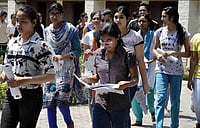The government’s intervention to bail out Jet Airways will amount to rigging the competition in the aviation sector, say experts.
Jet Airways, India’s second-largest airline, plunged into a deeper crisis after its pilots, on Tuesday, gave an ultimatum to go on strike if not paid their salaries by April 1.
Over 20,000 Jet employees haven’t been paid for over three months as the company is cash-strapped due to various reasons, prominent among them is bad financial management.
At present, out of 119 of its aircraft, 47 have been grounded, which led to the cancellation of over 250 flights every day.
So what has brought the company to the brink of an existential crisis?
A section of experts blame the rising fuel prices, which increased the company’s operational costs more than its earnings, whereas others point towards the company’s bad financial planning.
Ramesh Dugar, a chartered accountant and a new entrant to the aviation sector, says that the cost of Jet Airways per seat/per km is about Rs 4.15, whereas it is charging about Rs 3.65 per seat/per km from fliers. “It’s a bad business model which has brought the airline to this mess,” Dugar who is not in favour of the government asking banks to bail out the company by infusing more money into it, told Outlook.
Sources in Jet say that they had to offer cheaper tickets to stay in competition with their rivals such as IndiGo and SpiceJet.
“Why should the government ask the banks to give public money to a company which has itself caused the financial mess?”, says an aviation expert requesting not to be quoted.
He draws a parallel saying the government’s financial support to Air India was one of the reasons why Kingfisher Airlines failed.
“With the government’s support, Air India offered cheaper tickets to fliers on those routes on which Kingfisher was its rival. While Air India rode on government’s money, Kingfisher went bust,” he told Outlook.
The public money went waste in both ways. Kingfisher’s bank loan turned into an NPA whereas Air India never made profits even after the government help.
However, a section of experts say that SpiceJet at one point of time was in deep financial trouble when the government stepped in to help it by extending a liberal moratorium on various things, like fuel supply, airport dues, and all other service charges so that the airline revived.
Though Jet Airways has a typically different situation, yet, experts still believe the banks have ways to bail it out.
“SBI has already signed an agreement stating that they are willing to convert their loan into equity. The biggest problem is the founding chairman, Naresh Goyal, who wants everything but at the same time he doesn’t want to do anything,” said D. Sudhakara Reddy, National President & Founder of Air Passengers Association of India (APAI).
Reddy believes that Jet has a very good chance of survival and “it will happen within and week or so”.
Many others also agree that founding chairman Naresh Goyal has been a stumbling block in all the resolution plans as he is not ready to reduce his stake in the company.
A consortium of banks led by State Bank of India, which had given a loan of over Rs 8,200 crore, has refused to bail out the company unless the promoters infuse funds. The other promoter, Etihad, which holds a 24 percent stake, instead of putting in more money has asked the banks to purchase its share.
Earlier, Naresh Goyal had asked Etihad to fund Rs 750 crore to meet the operational expenses, but the latter wanted to buy 24.9 percent more stake in the company, to which Goyal didn’t agree.
Some experts also look at it as a ploy of Jet Airways to let the situation deliberately aggravate just before the elections so that the government will have no way but to bail it out.
"Which government will want to see over 20,000 employees losing their jobs just before the elections when unemployment is a major election issue?,” says a retired senior official of the Ministry of Civil Aviation.






.jpg?w=801&auto=format%2Ccompress&fit=max&format=webp&dpr=1.0)













.jpg?w=200&auto=format%2Ccompress&fit=max)

_550_550.jpg?w=200&auto=format%2Ccompress&fit=max)



